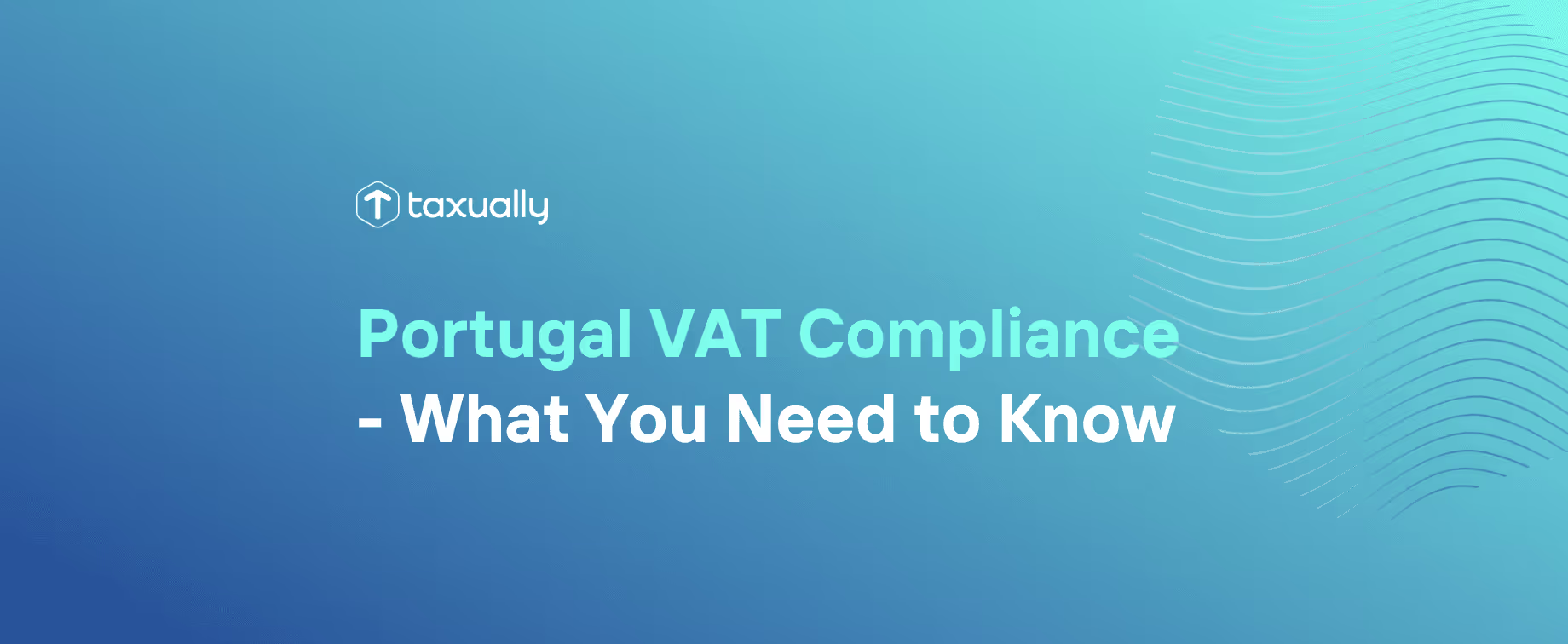Key takeaways
- Portugal has a standard VAT rate of 23%, with reduced rates and exemptions available for specific goods and services.
- Businesses operating in Portugal must register for VAT before starting taxable activities, with a deadline of 15 days after company establishment. Distance sellers have a €10,000 threshold for registration.
- Adherence to invoicing rules is essential as well as filing frequency & deadlines when submitting returns. The SAF-T scheme is in place while non-compliance may result in fines or other sanctions.
You may be wondering why understanding the VAT system in Portugal is so important. Well, being well-versed in VAT rates, registration requirements, and compliance obligations is crucial for any business operating in the country. So, with that in mind, we've put together a guide that will provide a fresh perspective on the topic, equipping you with the knowledge that will help you navigate the Portuguese VAT landscape.
Overview of Portuguese VAT rates
There are different VAT rates and exemptions in Portugal that businesses must be aware of. The standard VAT rate is 23%, applicable to most goods and services. There is also a reduced rate of 13% and a super-reduced rate of 6% for certain goods and services. Additionally, some transactions are exempt from VAT altogether.
Standard VAT rate - 23%
The standard VAT rate in Portugal is 23%, which is one of the highest in the European Union. This rate applies to most goods and services that are not eligible for reduced or super-reduced rates. Common items subject to the standard rate include electronics, clothing, and most everyday consumer products.
Reduced VAT rate - 13%
Portugal offers a reduced VAT rate of 13% for specific goods and services. This reduced rate is typically applied to items considered essential or with a societal benefit. Some examples of products and services taxed at this rate include:
- Restaurant and catering services (excluding alcoholic beverages).
- Some types of food products.
- Admission to some cultural events.
- Certain agricultural supplies
Reduced VAT rate - 6%
A super-reduced VAT rate of 6% is applied to those goods and services deemed essential. This lower rate is intended to alleviate the financial burden on consumers for items that are considered basic necessities. Some items subject to this rate include:
- Medical equipment and supplies.
- Books (excluding e-books).
- Certain pharmaceutical products.
- Water supply for residential use.
VAT exemptions
Certain transactions in Portugal are exempt from VAT, providing relief for both businesses and consumers. These exemptions apply to transactions such as healthcare, education, and financial services. This means that businesses providing these services are not required to charge VAT on their transactions, thus reducing the financial burden on their customers.
It's important to note that VAT rates can change over time, so it's advisable to check the latest rates with the Portuguese Tax Authority or consult with a tax professional for the most up-to-date information.
VAT registration in Portugal

To register for VAT in Portugal, businesses need to submit the necessary documentation to the Portuguese tax authorities (Autoridade Tributária e Aduaneira - AT) and obtain a VAT identification number (Número de Identificação Fiscal - NIF) specifically for VAT purposes.
When to register
Companies operating in Portugal must ensure they register for VAT before starting any taxable activities. This is not only a legal requirement, but also essential for smooth business operations. The deadline for VAT registration is 15 days after the company is established with a business registry.
Failing to register for VAT within the specified deadline can result in penalties and disruptions in business operations. As such, proactively registering for VAT in a timely fashion is a necessity to comply with Portuguese regulations.
Distance sellers are required to register for VAT once the threshold of €10,000 for intra-community distance selling has been exceeded.
Registration process
Registering for VAT in Portugal involves the following steps:
- Gather required documents: Prepare necessary documents, including identification, proof of address, and company registration details.
- Access the portal: Visit the Portuguese tax authority's online portal (Portal das Finanças).
- Complete registration form: Fill out the VAT registration form, providing accurate information about your business.
- Submit application: Submit the completed form electronically through the portal.
- Await confirmation: Wait for the tax authority to review your application. They may request additional information or clarification.
- Receive VAT number: Upon approval, you will receive a Portuguese VAT number.
It typically takes around two weeks for your VAT registration to be processed.
Fiscal representation
Non-EU-based companies are required to appoint a fiscal representative. A fiscal representative acts as an intermediary between non-EU businesses and the Portuguese tax authority, liaising with the tax authority on their behalf and ensuring adherence to Portugal’s tax regulations.
VAT compliance and reporting
To maintain VAT compliance in Portugal, businesses must adhere to specific invoicing rules, filing frequency, and submission requirements, all of which are part of their VAT obligations.
Invoicing rules
Invoices play a crucial role in VAT compliance in Portugal. To be compliant, invoices must include specific information such as date, sequence number, and VAT ID. Maintaining accurate VAT records and reporting requires that all invoices comply with these requirements.
Article 36 of the Portuguese VAT Code outlines the required information to be included on invoices. This includes:
- Date
- Invoice number
- VAT number of business
- Name and address of supplier and customer
- Description of goods or services
- Quantity and unit price
- Applicable VAT rate
- Amount of VAT due
- Total amount due
Adherence to these invoicing rules ensures businesses’ compliance with Portuguese VAT regulations.
Filing frequency and deadlines
VAT returns must be submitted electronically. The filing frequency for quarterly VAT returns in Portugal depends on the taxable person’s turnover in the previous calendar year. If the turnover is below €650,000, quarterly returns must be submitted, whereas businesses with a turnover above this threshold must file their report on a monthly basis. Businesses need to keep their filing frequency in mind to ensure the accurate and prompt submission of VAT returns.
Deadlines for submitting VAT returns vary based on the filing frequency. Monthly VAT returns must be submitted one month and 10 days after the end of the reporting period. Quarterly returns must be filed within one month and 15 days of the same period. Maintaining VAT compliance in Portugal requires strict adherence to these deadlines.
SAF-T in Portugal
The Standard Audit File for Tax (SAF-T) is a standardized XML file that must be submitted by businesses conducting commercial, industrial, or agricultural activities in Portugal. This electronic file allows tax authorities to efficiently audit and monitor businesses.
Companies are required to submit the SAF-T file on a monthly and annual basis, adhering to the guidelines set by the Portuguese tax authorities. Businesses can effectively demonstrate their VAT compliance and avoid potential penalties by complying with the SAF-T submission requirements.
Penalties for non-compliance

The penalties for failing to submit or filing VAT returns late can range from €150 to €3,750. Failure to pay VAT or paying VAT late may incur penalties of 15% to 100% of the VAT amount owed, up to a maximum of €165,000. These penalties serve as a deterrent for businesses to ensure they remain compliant with VAT regulations in Portugal.
VAT recovery in Portugal
Businesses operating in Portugal can reclaim VAT on expenses incurred in the country, subject to certain conditions and procedures. This process allows businesses to reclaim the VAT paid on eligible purchases, thus reducing their overall tax burden. However, not all expenses are eligible for VAT recovery, and businesses must carefully assess their transactions to determine the recoverable VAT.
Certain taxable persons are now eligible for a 100% deduction of the VAT on expenses associated with specific activities. Businesses operating in Portugal can maximize their VAT recovery potential by understanding the VAT reclaim process and diligently tracking their expenses.
Conclusion
Staying informed and up-to-date with the latest VAT regulations in Portugal is the key to maintaining VAT compliance and ensuring the success of your business. Embrace the complexities of Portuguese VAT, and let it guide your business to new heights.
Do you need help with your VAT compliance? Book a free call with one of our VAT experts to find bespoke solutions for your business, optimize your VAT costs, and reach millions of new potential customers.
Frequently asked questions
New Year's Day - 1/1/2024Memorial Day - 5/27/20244th of July - 7/4/2024Labor Day - 9/2/2024Thanksgiving Day - 11/28/2024Day after Thanksgiving - 11/29/2024Christmas Eve - 12/24/2024Christmas Day - 12/25/2024
What is the VAT rate in Portugal in 2023?
In Portugal in 2023, the standard VAT rate is 23%. A 13% reduced rate and a 6% super-reduced rate apply to some goods and services.
Is the VAT rate in Portugal 16%?
Yes, the VAT rate in Portugal is 16%, as it applies to the Autonomous Region of the Azores.
What is exempt from VAT in Portugal?
Goods and services exempt from VAT in Portugal (meaning no VAT is charged) include the provision of hospital and medical care, education services, insurance, and certain financial services.



















